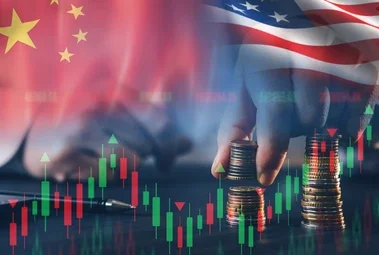Chinese investments in the United States have plummeted since Donald Trump’s first term, and analysts predict this trend will persist as he returns to the White House. The combination of stricter regulatory environments, political tensions, and Trump’s own policies suggests little incentive for Chinese firms to ramp up their U.S. investments.
Data from the American Enterprise Institute reveals that Chinese investments in the U.S. reached just $860 million in the first half of 2024, a steep decline from the $46.86 billion recorded in 2017 during Trump’s initial term.
“That’s probably the last thing on Trump’s mind, is trying to incentivize [Chinese companies] to invest here,” said Rafiq Dossani, an economist at the RAND Corporation. “There’s an ideological mismatch. All the rhetoric is, keep China out of the U.S.”
Dwindling Investments and Shifting Strategies
The sharp decline in investments marks a stark contrast to earlier years when Chinese firms made high-profile acquisitions, such as the purchase of the Waldorf Astoria hotel in New York.
In recent years, however, Beijing has tightened capital controls, and U.S. regulators have increased scrutiny on Chinese investments, particularly in sensitive industries. Danielle Goh, senior research analyst at Rhodium Group, noted that Chinese firms are now favoring smaller joint ventures and greenfield investments.
“Instead of acquisitions, Chinese companies are turning to joint ventures or starting businesses from scratch,” Goh said.
For example, Chinese battery manufacturer EVE Energy holds a 10% stake in a joint venture with U.S. engine company Cummins’ Accelera division, Daimler Truck, and PACCAR. The consortium plans to build a battery factory in Mississippi by 2027, creating over 2,000 jobs.
Political and Regulatory Barriers
Trump’s policies and rhetoric have exacerbated the decline. During his campaign, Trump reiterated his commitment to using tariffs and economic incentives to force companies to manufacture in the U.S.
“The way they will sell their product in America is to BUILD it in America, and ONLY in America. This will create massive jobs and wealth for our country,” Trump said during his Republican nomination acceptance speech.
At the state level, more than 20 legislatures have introduced or updated laws restricting land purchases by Chinese citizens and companies, further discouraging investment.
“Most investments nowadays tend to be a little bit smaller, so they are not on the radar and easier to approve,” said Siva Yam, president of the U.S.-China Chamber of Commerce.
Tensions Beyond Economics
Geopolitical tensions have also played a role. In December, Chinese hackers reportedly targeted a U.S. government office responsible for reviewing foreign investments, as part of a broader breach of the Treasury Department. These cybersecurity concerns have added another layer of skepticism around Chinese investments.
Meanwhile, U.S. politicians have accused Chinese companies of posing risks to national security, particularly in sectors like technology and infrastructure.
Trump’s Mixed Record
Despite Trump’s hardline stance, his first term included decisions that raised eyebrows. In 2018, the Trump administration lifted restrictions on Chinese telecom giant ZTE shortly after the Chinese government and banks invested $1 billion in a Trump Organization-affiliated theme park in Indonesia.
Advocacy groups like the Center for American Progress criticized the move, questioning whether Trump’s policies were influenced by his business interests.
Uncertain Future for Chinese Investments
Analysts agree that large-scale Chinese investments in the U.S. are unlikely to recover soon. Derek Scissors, a senior fellow at the American Enterprise Institute, pointed out that even if Trump encourages Chinese investments, such efforts take years to materialize.
“Trump saying the U.S. is open to Chinese companies in 2025 is no guarantee [even] for 2029,” Scissors said.
Instead, Chinese firms appear to be adapting to the new reality by focusing on smaller, less conspicuous projects. The U.S.-China Chamber of Commerce has also shifted its focus to helping Chinese e-commerce firms set up local offices rather than large-scale manufacturing operations.
Other Countries Fill the Gap
While Chinese investments dwindle, other nations are stepping up. Recently, Emirati property giant Damac pledged $20 billion for U.S. data center projects, and Japan’s SoftBank announced a $100 billion commitment to artificial intelligence development in the U.S.
These moves highlight a shift in global investment patterns, with the U.S. attracting significant capital from non-Chinese sources.
Conclusion
As Donald Trump’s administration begins, the relationship between the U.S. and China appears poised for further strain. For now, Chinese firms remain cautious, favoring smaller investments and joint ventures over high-profile acquisitions.
With regulatory hurdles, political tensions, and economic uncertainty, the future of Chinese investments in the U.S. remains clouded, offering little hope for a return to the peak levels seen during Trump’s first term.
Read More News: https://analysissphere.com/israel-and-hamas-hostage-release-deal/

